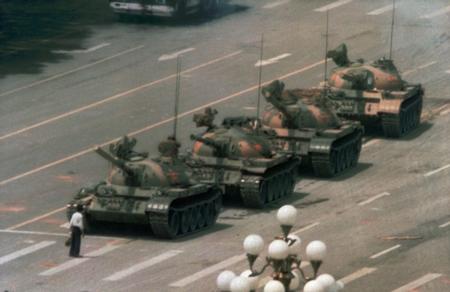Tank Man (The Tienanmen Square Massacre)
 Byrnzie
Posts: 21,037
Byrnzie
Posts: 21,037
Google Video: http://video.google.com/videoplay?docid ... man&hl=en#
Torrent: http://www.vertor.com/torrents/1108235/ ... %282006%29
Anyone seen this? It's a very good documentary on the 1989 Tienanmen Square Massacre and asks what's happened to the man involved in the famous photograph. It also brings us up to the present and sheds some light on China today and the anger with the government felt by the majority of the population, simmering under the surface, and occasionally boiling over in often unreported protests and rioting.

Torrent: http://www.vertor.com/torrents/1108235/ ... %282006%29
Anyone seen this? It's a very good documentary on the 1989 Tienanmen Square Massacre and asks what's happened to the man involved in the famous photograph. It also brings us up to the present and sheds some light on China today and the anger with the government felt by the majority of the population, simmering under the surface, and occasionally boiling over in often unreported protests and rioting.

Post edited by Unknown User on
0
Comments
http://www.guardian.co.uk/world/2009/se ... ms-embargo
Mandelson says China must tackle human rights
Guardian.co.uk, Tuesday 8 September 2009
Promoting human rights would help China's economy and lead to the lifting of EU arms embargo, business secretary tells officials
'China should address human rights concerns if it wants the 20-yearEU arms embargo to be lifted, Lord Mandelson told young officials in Beijing today.
The business secretary also told an audience at the Central Party School – which trains middle and higher ranking Communist cadres – that promoting human rights such as freedom of expression would help China's economy to continue growing in the long run.
The EU arms embargo was imposed following the bloody military crackdown on supporters of pro-democracy demonstrations in Tiananmen Square in 1989, in which hundreds, possibly thousands, died.
Mandelson is leading a delegation of British businessmen to promote trade and co-operation in a range of areas, particularly low carbon economic development. His speech to the school focused on combating protectionism, promoting economic and financial reforms, and tackling climate change.
Asked why China was expected to act as a responsible stakeholder internationally, but was left "holding different stakes" due to the ban, Mandelson said the embargo resulted from the events in Tiananmen Square.
"If you want us to revise our opinion and to positively and favourably review the existence of the embargo, then you have to have a dialogue with us about political rights and freedom of expression in China – because inevitably these things are going to be linked in the minds of the public and policy makers in Europe," he said.
The business secretary said dialogue on such issues "has got better and stronger with every year", but added: "There are some things we in Europe would like China to accept or sign up to, just as there are things you would like us to repeal or adjust. Perhaps there are the makings of good bargaining there."
He added that Europeans did not see the ban as singling out China or deeming it a second class country.
Beijing has repeatedly pressed for the relaxation of the EU ban, which it describes as "puzzling" and "a product of the cold war". But the US and Japan have strongly opposed proposals to end the embargo, fearing it would shift the regional balance of power.
Mandelson added afterwards: "I don't want to pitch a deal to the Chinese on the arms embargo.
"[But] I think it's reasonable for us in Europe, if we are going to make a move on the arms embargo, that we see clear steps forward in individual and political rights and freedom of expression in China, which sparked our concern in the first place."
The EU came close to lifting the ban in 2005, after repeated calls from Germany and France. Supporters of the move said the code of conduct on arms exports would ensure that effective controls remained in place and Jack Straw, then foreign secretary, said it was wrong to put China under the same embargo as countries such as Zimbabwe and Burma.
The Financial Times reported this weekend that UK Trade & Investment – the government export promotion agency – had invited a Chinese military delegation to Britain's biggest arms fair, which begins today in London.
The business secretary also warned his audience against creating a hierarchy of human rights "difficult to sustain logically and in practice", after another man suggested that sometimes rights might have to be limited for the sake of economic development.
He added: "I fully accept developing countries will find it harder to fulfil these basic entitlements than more advanced economies and societies. It's a question of direction of travel, a question of aspirations and the progress that is made, rather than barriers or obstacles put in the way.
"As people live better they will wish to live more freely; as employment and their incomes become richer, so too will their desire for expression."
He said developing freedom of expression would be a powerful stimulus to the creativity which will in the long run safeguard China's economic growth.
The business secretary acknowledged "bumps on the road" but said he believed overall political and other rights in China had strengthened rather than weakened in recent years.
Mandelson will take part in events to promote carbon-reduction and British trade with China during his five-day trip.
"No one country holds the key to agreement in Copenhagen. What I am saying to China is that first and early movers will not only limit the costs and damage tot heir own countries and climate change, but realise huge economic and employment opportunities that come from the transition," he told reporters.
"We can do that together. There's a huge source of new trade and investment, exchange of knowledge and technologies, in the transition to low carbon – that's something I want to target between Britain and China."